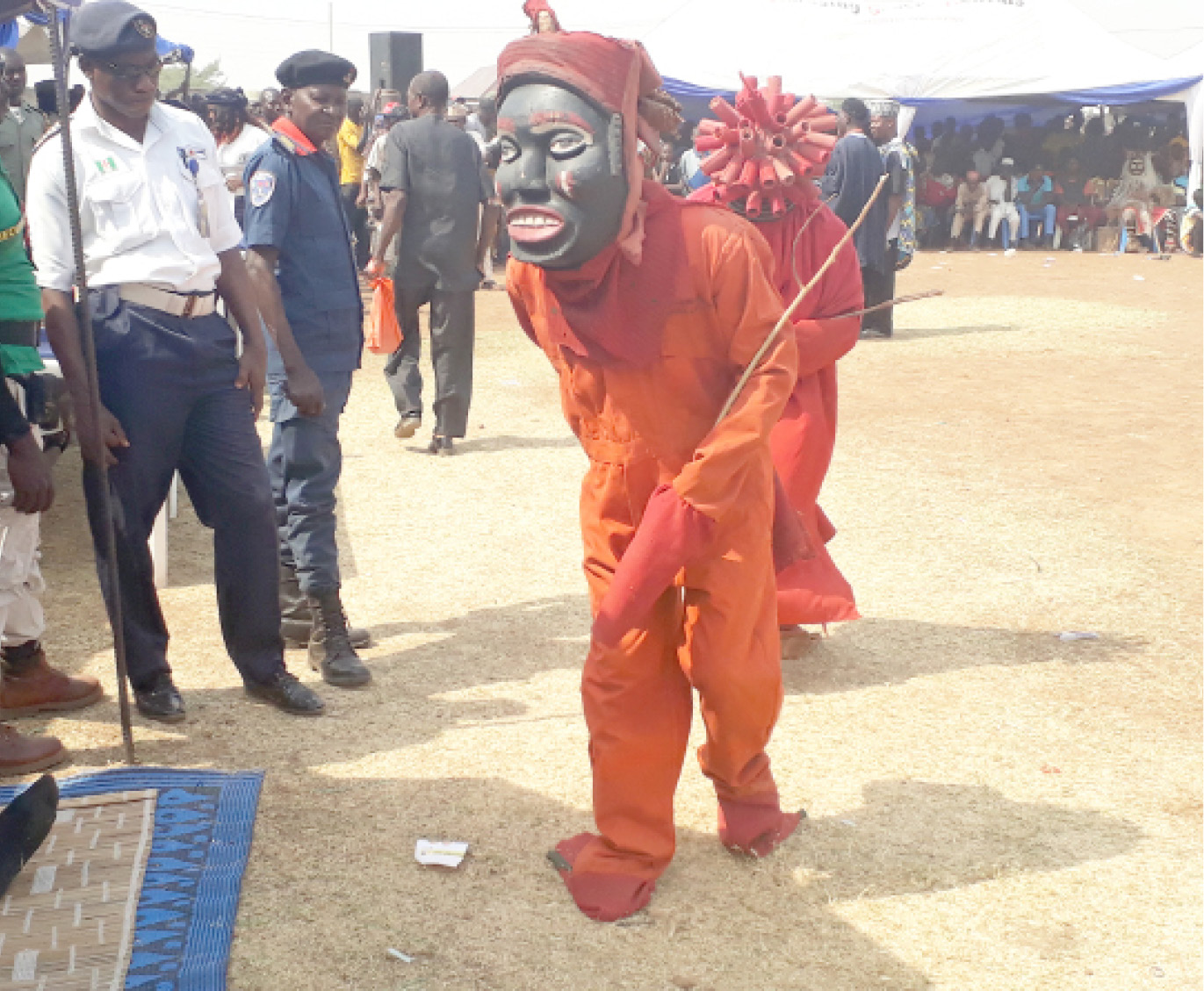Gbari thrill residents with dances, masquerades at carnival
Gbari masquerades, some of them children, and musicians and dancers last Saturday gave scintillating performances which got thousands of spectators who converged on the Kwali mini stadium raving. Thousands of Gbari natives, one of the nine original inhabitants of the Federal Capital Territory (FCT), converged on the venue of the 3rd Gbari National Cultural Carnival […]

Masquerades perform during the celebration of Gbari cultural carnival in Kwali on Saturday
Gbari masquerades, some of them children, and musicians and dancers last Saturday gave scintillating performances which got thousands of spectators who converged on the Kwali mini stadium raving.
Thousands of Gbari natives, one of the nine original inhabitants of the Federal Capital Territory (FCT), converged on the venue of the 3rd Gbari National Cultural Carnival to celebrate their culture and foster unity.
The cultural carnival attracted politicians, academics and technocrats from various parts of the country who are of Gbari extraction, as well as their friends.
Speaking at the carnival, the Etsu of Kwali, His Royal Highness (HRH) Alhaji Shaban Nizazo (III), said the event was organized to serve as a symbol of peace and unity among Gbari sons and daughters, including those in the diaspora.
He said the Gbari culture and tradition are gradually being revamped and what was left was to see how the young generation will sustain it.
The carnival was also an avenue to educate the youth on their roots, which, he said, would help them sustain the culture.
“We are not isolated, as we are Nigerians and we must also cooperate with other ethnic groups for the development of the country, but more importantly, we must sustain the Gbari culture and tradition which has eroded over the years,” he said.
Also speaking, Senator Philip Aduda, who was the chairman of the occasion, represented by his senior special adviser, Mr Julius Gado, appreciated the organisers of the event, saying the cultural display by various Gbari natives was the best way the younger ones will also learn and sustain the Gbari culture.
Aduda, therefore, urged the Gbari youth to give attention to education, saying it was the bedrock of any society that gives individuals a sense of belonging.
The chairman of the council, Mr Danladi Chiya, said his administration would continue to promote the culture of the natives of the FCT in order to ensure continuity.
He further said the council would ensure it sustained and reinvigorated the Gbari cultural carnival.
“The reinvigoration of the Gbari culture and its sustenance should be a point of duty especially by our elders so that the younger ones will sustain it,” he said.
An educationist, Dr Midah Kwali Ayuba, in a paper he presented at the occasion titled ‘Effects of Foreign Religion on the Culture of the Gbari People’, said: “The Gbari values are cherished tradition and ethos which are desirable to the society and taken as normative civilization.”
According to him, the Gbari value system is subsumed in discipline, disposition to obey orders and fulfil responsibilities which, he said, was reinforced through the organisation of age-grades, to favour the well-behaved and punishment for deviants.
“Also, one of the things that the Gbari believe, aside from religion, is hard work and self-reliance. Honour has also been on top of their life agenda as their whole existence is guided by the sense of shame in things spiritual and moral,” he said.
He explained that in Gbari traditional society, a person would rather starve to death than rely on others for food, saying reliance on others for anything is considered as humiliating to the individual in addition to bringing dishonour to the entire family.
He added that “idleness and laziness are not only abhorred, but they are also treated as taboo. No wonder in the Gbari communities, the disabled are kept within the family household and fended for by the extended family.”
Dr Midah noted that the Gbari culture has sustained the people for generations, “but the two imported religions came heavily on the Gbari cultural world, bringing about a bartering and shattering experience and irreparable cultural trauma.”
According to him, the effect is regarded as the conquest of the traditional culture in history when the whirlwind of the cross current of the two faiths bartered and shattered the ancient crust of the traditional Gbari cultural phenomenon.
He, however, observed that Gbari scholars, commentators, elite, elders, and youth as well as sympathizers have expressed doubt and worries over the solidarity of the Gbari social structure.
“But today, the two foreign religions have brought about the decline of the Gbari traditional world, the undoing of the old cultural setup and the rapid erosion of old values. The Gbari culture, therefore, is gradually running into extinction and something must be done to stop this,” he said.
“Today, instead of the Gbari people to relate with their brothers and sisters using cultural affinity, they use the force of religion to identify themselves; instead of a Gbari man identifying himself first as a Gbari person, he uses the force of religion as his or her identity,” he added.
